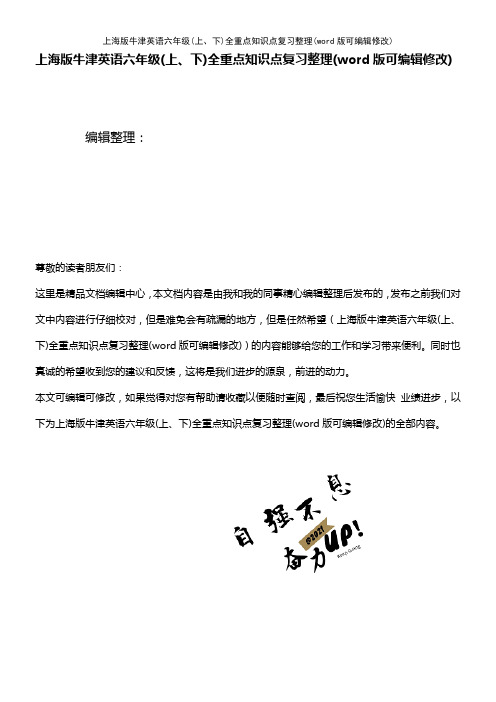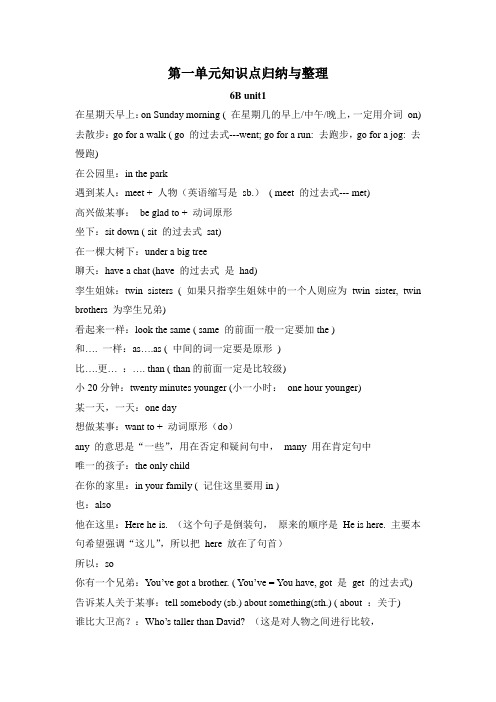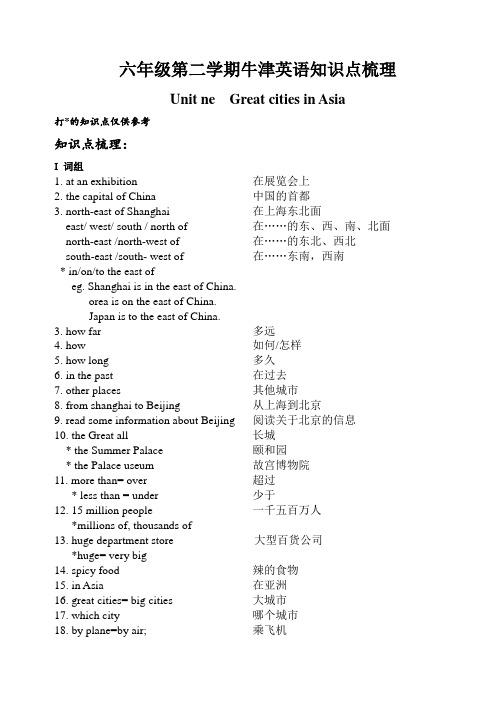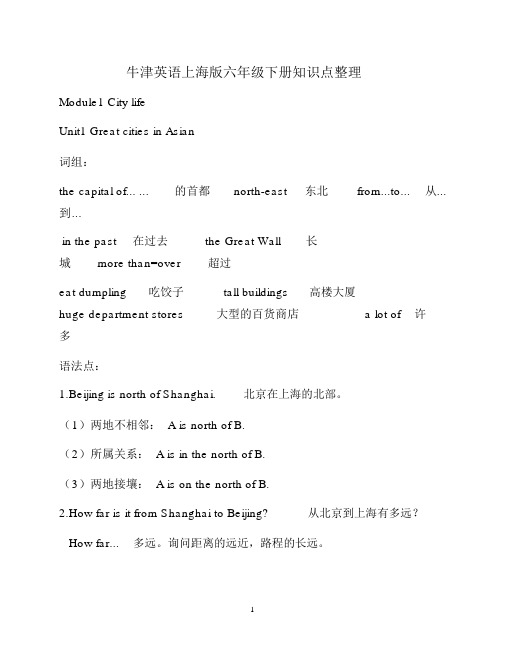2020年沪教牛津版英语六年级下册unit7-9复习知识点资料
上海版牛津英语六年级(上、下)全重点知识点复习整理(K12教育文档)

上海版牛津英语六年级(上、下)全重点知识点复习整理(word版可编辑修改) 编辑整理:尊敬的读者朋友们:这里是精品文档编辑中心,本文档内容是由我和我的同事精心编辑整理后发布的,发布之前我们对文中内容进行仔细校对,但是难免会有疏漏的地方,但是任然希望(上海版牛津英语六年级(上、下)全重点知识点复习整理(word版可编辑修改))的内容能够给您的工作和学习带来便利。
同时也真诚的希望收到您的建议和反馈,这将是我们进步的源泉,前进的动力。
本文可编辑可修改,如果觉得对您有帮助请收藏以便随时查阅,最后祝您生活愉快业绩进步,以下为上海版牛津英语六年级(上、下)全重点知识点复习整理(word版可编辑修改)的全部内容。
上海牛津英语六年级上下册全知识点梳理频度副词always/sometimes/usually/never 是频度副词,提问应该要用How often…?在句中的位置是:放在行为动词的前面,放在be动词的后面。
也可以说“行前系后".E.g She is always kind.她总是很善良的。
She always helps other people。
她总是帮助其他人.不能出现这样的句子:She is always helps other people。
(×)一句话中不能同时出现两个动词。
并且要注意主谓保持一致,尤其注意第三人称单数不可以忽略.how often 与 how many timeshow often 提问“频率次数+时间范围”how many times 提问“频率次数”e.g. —How often do you exercise? -Twice a week。
-How many times have you been there?—Twice。
副词表示动作特征或性状特征。
一般用来形容或修饰除了名词和代词以外的词,主要修饰形容词、动词、其他副词和句子.He looks very happy。
牛津英语六年下册各单元重点知识点归纳与整理

第一单元知识点归纳与整理6B unit1在星期天早上:on Sunday morning ( 在星期几的早上/中午/晚上,一定用介词on) 去散步:go for a walk ( go 的过去式---went; go for a run: 去跑步,go for a jog: 去慢跑)在公园里:in the park遇到某人:meet + 人物(英语缩写是sb.)( meet 的过去式--- met)高兴做某事:be glad to + 动词原形坐下:sit down ( sit 的过去式sat)在一棵大树下:under a big tree聊天:have a chat (have 的过去式是had)孪生姐妹:twin sisters ( 如果只指孪生姐妹中的一个人则应为twin sister, twin brothers 为孪生兄弟)看起来一样:look the same ( same 的前面一般一定要加the )和…. 一样:as….as ( 中间的词一定要是原形)比….更…:…. than ( than的前面一定是比较级)小20分钟:twenty minutes younger (小一小时:one hour younger)某一天,一天:one day想做某事:want to + 动词原形(do)any 的意思是“一些”,用在否定和疑问句中,many 用在肯定句中唯一的孩子:the only child在你的家里:in your family ( 记住这里要用in )也:also他在这里:Here he is. (这个句子是倒装句,原来的顺序是He is here. 主要本句希望强调“这儿”,所以把here 放在了句首)所以:so你有一个兄弟:You’ve got a brother. ( You’ve = You have, got 是get 的过去式) 告诉某人关于某事:tell somebody (sb.) about something(sth.) ( about :关于)谁比大卫高?:Who’s taller than David? (这是对人物之间进行比较,句型为:Who’s +比较级+ than…? 回答是:人称代词+ is )谁的书包更重,你的还是我的?:Whose school bag is heavier,yours or mine?看到句中有or, 前面一句话里的形容词或副词就要用比较级;句型为:Whose …. is + 比较级,… or…? 回答是:名词性物主代词+ is. /名词所有格+ is. yours 和mine 是名词性物主代词,名词性物主代词一定单独使用,后面不再跟名词。
上海牛津英语六年级第二学期知识点汇总

六年级第二学期牛津英语知识点梳理Unit ne Great cities in Asia打*的知识点仅供参考知识点梳理:I 词组1. at an exhibition 在展览会上2. the capital of China 中国的首都3. north-east of Shanghai 在上海东北面east/ west/ south / north of 在……的东、西、南、北面north-east /north-west of 在……的东北、西北south-east /south- west of 在……东南,西南* in/on/to the east ofeg. Shanghai is in the east of China.orea is on the east of China.Japan is to the east of China.3. how far 多远4. how 如何/怎样5. how long 多久6. in the past 在过去7. other places 其他城市8. from shanghai to Beijing 从上海到北京9. read some information about Beijing 阅读关于北京的信息10. the Great all 长城* the Summer Palace 颐和园* the Palace useum 故宫博物院11. more than= over 超过* less than = under 少于12. 15 million people 一千五百万人*millions of, thousands of13. huge department store 大型百货公司*huge= very big14. spicy food 辣的食物15. in Asia 在亚洲16. great cities= big cities 大城市17. which city 哪个城市18. by plane=by air; 乘飞机by ship=by sea; 乘船by train/ ferry 乘火车/ 渡轮19. That’s right. 对的。
牛津上海版六年级下Unit7-Unit10重点知识点复习及练习

六年级下U7-10重点知识点复习及练习Module 2 Unit 7 知识点梳理重点词组:1. a double-decker bus 一辆双层巴士2. a fare box 一个投币箱3. an air-conditioned bus 一辆空调巴士4. a public transportation card 一张公交卡5. a bus conductor一位公交车售票员6. by ferry/underground 乘轮船/乘地铁7. traffic jams 交通堵塞8. all of/ most of/ some of/ none of…所有的/大部分的/一些的/没有的9. in…years’ time 十年以后10. in the past 在过去11. have to / has to do sth. 不得不12. travelling in Garden City 花园城市的交通13.more pavements/crossings/footbridges/ escalators/car parks/tunnels更多的人行道…..14. fewer traffic jams 更少的交通堵塞15.less traffic 更少的交通16. take an underground to…= go…by underground 乘地铁去…重点句型:1.None of the bus drivers were women in the past.2.What will travelling in our city be like in 10 years’ time?3.Perhaps all/most/some/none of the people will travel by…4.Perhaps there will be more/fewer…小作文范文:There are a lot of traffic jams every day. There aren’t enough underground. There aren’t a lot of flyovers. More and more people like travelling by underground. Not many people like going out by ferry. Fewer people like riding motorcycles. Perhaps there will be fewer traffic jams because there will be much more flyovers. People don’t have to walk across the crossings because there will be more footbridges.Module 2 Unit 7 复习练习Ⅰ. 默写1. 一辆双层巴士_____________2. 一个投币箱_______________3. 一辆空调巴士______________4. 一张公交卡_______________5. 一位公交车售票员__________6. 乘轮船/乘地铁_____________7. 交通堵塞__________________8. 所有的/大部分的/一些的/没有的___________________________9. 十年以后_________________ 10.在过去____________________11. 不得不__________________ 12.花园城市的交通___________13.更多的人行道____________ 14.更少的交通堵塞____________15.更少的交通______________ 16.乘地铁去_________________Ⅱ.Complete the sentences with the given words in their proper forms.(用括号中所给单词的适当形式完成下列句子)1.What will _______ in Shanghai be like in the future? (travel)2.There are no ________(conduct) on the bus.3.You can use a public ____________ card. (transport)4.One of the ____________(air-condition) doesn’t work.5.In the future, we can see ________(many) flyovers, _______(few) ferries and _______(little) traffic.Ⅲ. Choose the best answer. (选择最恰当的答案) 15%( ) 1. There are only two ____________ in this office.A. man doctorsB. men doctorC. men doctorsD. mans doctors( ) 2. Passengers do not buy tickets now. They put money in a box _______.A. alsoB. tooC. eitherD. instead( ) 3. What________ Shanghai ________ in 10 years’ time?A. will …likeB. is…likeC. is…be likeD. will…be like( ) 4. There is no ________ in the village.A. carsB. busesC. trafficD. taxis( ) 5. ________ of the students likes this kind of music.A. BothB. AllC. MostD. None( ) 6. Are you going to Canada ______ ship?A. byB. withC. forD. in( ) 7. I would rather ______ at home.A. not stayB. not to stayC. not stayingD. not stayed( ) 8. Nowadys, there_______ a lot of trafffic jams in Shanghai.A. isB. areC. wasD. were( ) 9. He collected money _________ the passengers on the bus.A. inB. toC. withD. from( ) 10. I think _______ of the books are useful and you can read them .A. muchB. moreC. mostD. the mostⅣ.Rewrite the following sentences as required. (根据所给要求,改写句子,每空格限填一词)1.All of the bus drivers are men. (否定句)_____ _____ the bus drivers are men.2.The conductor put the money in the bag. (划线提问)______ ______ the conductor put the money?3. I stayed at home yesterday. I didn’t go out to play yesterday. (合为一句)I stayed at home ______ ______ ______ out to play yesterday.4. People will build more footbridges in the future. (划线提问)________ ________ people build in the future?Module 2 Unit 8 知识点梳理重点词组:1. blow gently 轻轻地吹2. a gentle wind 微风3. fall down slightly 轻轻地落下4.a slight fever 微烧5.break windows suddenly 忽然打碎玻璃6. a sudden call 突然电话7.hold one’s raincoats tightly 紧抓雨衣 8.tight jeans紧身的牛仔裤9. move fiercely 猛烈移动 10. a fierce shark凶狠的鲨鱼11. sink slowly 慢慢下沉 12.a slow train慢车13.pass quickly 快速经过 14. a quick wave急浪15.walk carefully 小心翼翼地经过 16. careful students细心的学生17.take flower pots to(into) flats immediately 立即把花盆端进房间18.immediate food即食/速食食品19. go windsurfing happily开心地玩冲浪20. happy street cleaners快乐的街道清洁工21. see…do/doing看….干了/正干重点句型:1. What can you see when there is a gentle wind?I can see people flying kites in the park when there is a gentle wind.2.Heavy objects may fall on cars in the streets.3.They flew their kite in the park.小作文范文:Typhoon is a kind of strong wind. When there is a typhoon, we can see the clouds moving quickly. The wind blew fiercely. Typhoon is dangerous to us . Heavy objects may fall on cars in the streets. A strong wind may blow away flower pots outside people’s flats. A strong wind may break windows. We shouldn’t go outside when a typhoon is coming. Drivers should park their cars in the parking places.All ships and boats have to stay in typhoon shelters.Module 2 Unit 8 复习练习Ⅰ. 默写1.轻轻地吹____________2. 微风_______________3. 轻轻地落下___________4. 微烧________________5. 忽然打碎玻璃______________6. 突然电话____________7. 紧抓雨衣__________________ 8. 紧身的牛仔裤_______________9. 猛烈移动__________________ 10.凶狠的鲨鱼_________________11. 慢慢下沉_________________ 12.慢车________________________13. 快速经过________________ 14. 急浪________________15. 小心翼翼地经过___________ 16.细心的学生_________________17. 立即把花盆端进房间_____________________18.即食/速食食品__________________________Ⅱ.Choose the best answer:( ) 1. There _______ car races in a week.A. is going to beB. are going to beC. will haveD. is going to have ( )2. What will happen _____ a windy dayA. inB. onC. atD. of( )3. We can see people ______ morning exercise in the parkA. doB. doesC. doingD. done( ) 4. There are different _______ of books in the library.A. kindB. kindsC. kindlyD. kindes( ) 5. Alice helps Kitty _______ a display board.A. makeB. makingC. doD. doing( ) 6. People hold their raincoats _______ when there is a typhoon.A. tightB. tightlyC. slightD. slightly( ) 7. People like windsurfing ____ the sea.A. inB. onC. atD. over( ) 8. The Titanic sank _____ the sea in 1912.A. inB. onC. underD. below( ) 9. Stop smoking immediately. The underlined part means______.A. at onceB. at lastC. at firstD. quickly( ) 10. The strong wind blew my kite______.A. wayB. alwaysC. awayD. goneⅢ.Filling the blanks with the proper words:1. There are many _______ on the tree. (leaf)2. The cars move _______ when there is a traffic jam. (slow)3. The trees ______ down when there was a typhoon. (fall)4. The wind blows _______ when there is a ________ wind. (gentle)5. My grandfather lives _______ on the farm. (happy)Ⅳ.Rewrite the sentences1. The clouds moved quickly. (对划线部分提问)______ did the clouds ______?2. A strong wind may break windows. (对划线部分提问)_____ may a strong wind ______?Module 2 Unit 9 知识点梳理重点词组:1. three quarters/ a quarter 四分之三/四分之一2. on the Earth 在地球上3. sea animals 海洋动物4. the most intelligent/dangerous /interesting/important/beautiful最聪明的/最威胁的/最有趣的/最重要的/最漂亮的5. get food from the oceans从海洋中获得食物6. use/need…to do sth. 使用/需要…去做…7.be important to 对…很重要8.keep…clean 保持干净9.stop polluting 停止污染10.brush one’s teeth 刷牙11. take a shower 冲澡,淋浴12.take a bath坐浴,泡澡13.on one’s farms 在农场里14.a dripping tap滴水龙头15.a running tap冲水龙头重点句型:1. If there is no rain, we will have no water to drink.2.How can we save water?We can save water by fixing a dripping tap.We can save water by not playing water games.3.we can save water by taking a shower instead of a bath.小作文范文:Water is very important to all animals and people on the earth. Many fish and animals live will die without water. If there is no rain , we will have no water to drink. If there is no rain, we won’t have any water to wash our clothes or to wash the dishes. Farmers need water to water to water the crops and vegetables. Cooks need water to cookfood.Firemen won’t put out fires without water. However, people sometimes waste precious water. Let’s save water . We can save water by fixing a dripping tap. We can take a shower instead of a bath. We mustn’t brush your teeth under a running tap. We promise not to play a water games.Module 2 Unit 9 复习练习Ⅰ. 默写1. 四分之三/四分之一________________2. 在地球上_____________________3. 海洋动物_________________4.从海洋中获得食物____________________5.最聪明的/最威胁的最有趣的最重要的最漂亮的__________________________6.. 使用/需要…去做…________________7. 对…很重要____________________8. 保持干净________________________ 9. 停止污染______________________10. 冲澡,淋浴_________________________ 11.坐浴,泡澡________________12. 冲水龙头___________________Ⅱ. Choose the best answer(选择最恰当答案):( ) 1.Alex is ______intelligent boy and he likes playing ______ basketball.A. an; theB.a; theC. a;/D. an;/( ) 2.Take a shower _______ a bath.A. insteadB. instead ofC. instead toD. instead on( ) 3. Harry Potter is one of ________ to children in the world.A. most interesting booksB. the most interesting bookC. the most interesting booksD. the more interesting books( ) 4.Scientists use telescope(望远镜) _______ the skys.A. watchB. to watchC. watchingD. to watching( ) 5.Would you please keep the window _______?A. openB. openingC. to openD. opened( ) 6.What _______if there is no water?A. happenB. happenedC. will happenD. happens( ) 7. We can keep our city clean by _______ rubbish everywhere.A.throwingB. to throwC. not throwingD. not to throw( ) 8. I use water ______ the dishes ______ home.A. washing; atB. to wash; inC. to wash; atD. washing; in( ) 9. Don’t wash vegetables _______ a running tap.A. onB. atC. inD. under( ) 10. ________ can we look after the earth?A. WhatB. HowC. Which D Whoplete the sentences with the given words in their proper forms(用括号中所给单词的适当形式填空): 1. Whales are the ________animals on the Earth. (large)2. It’s ________to stand in front the moving car. (danger)3. Water covers almost three ___________of the Earth. (quarter)4. They’re preparing for a class _________about the oceans. (compete)5.________ use nets to catch fish and prawns. (fish)V.Rewrite the sentences as required.1.Whales are larger than any other animal on the Earth.(保持原句的意思)Whales are_______ _______ animals on the Earth.2. If there is no rain, farmers will have no water to water vegetables. (保持原句的意思)If there ______ any rain. Farmer _____ have _____ water to water vegetabes.3. We can save water by fixing dripping taps. (划线提问)______ ______ you save water?4. If there is no water, animals will die. (划线提问)________ will _______if there is no water?5. We can save water. Turn dripping taps off. (合为一句)We can save water ______ ______ dripping taps.We can save water. Don’t wash our hands under a running tap. (合为一句)We can save water ______ ______ _______our hands under a running tap专题知识梳理——句型转换句子改写包括一般疑问句、特殊疑问句、反义疑问句、否定句、感叹句、同义句、连词成句,考查的是学生对句式的掌握,特别需要强调的还是基本功:时态、单复数、基本词组搭配等。
牛津英语上海版六年级(下册)知识点整理

牛津英语上海版六年级下册知识点整理Module1 City lifeUnit1 Great cities in Asian词组:the capital of... ...的首都north-east东北from...to...从...到...in the past在过去the Great Wall长城more than=over超过eat dumpling吃饺子tall buildings高楼大厦huge department stores大型的百货商店 a lot of许多语法点:1.Beijing is north of Shanghai.北京在上海的北部。
(1)两地不相邻: A is north of B.(2)所属关系: A is in the north of B.(3)两地接壤: A is on the north of B.2.How far is it from Shanghai to Beijing?从北京到上海有多远?How far...多远。
询问距离的远近,路程的长远。
3.How long does it take to travel from Shanghai to Beijing bytrain? 坐火车从上海到北京要多久?(1) How long... 多久。
询问时间长短。
How long ⋯多长。
用于询物的问长度。
(2) by+ 交通工具,表示“乘 ...交通工具”,用 How 提问。
4.It takes about ten hours.大约需要十小时It takes (sb.) st. to do sth.做某事需要花费多长时间。
5.They enjoy eating dumplings.他们喜欢吃饺子enjoy/like/love doing sth.喜欢做某事6.Two and a half days=Two days and a half两天半Half an hour=one and a half hours=one/an hour and a half一个半小时Unit2 At the airport词组:plane ticket机票silk scarf丝巾 a lot of/plenty of大量的,许多departure time出发时间leave for出发去某地have to不得不be going to将要arrive at到达boarding card登机牌name tap姓名语法点:1.Aunt Judy and Uncle Mike have lived in Los Angeles forsix years. 朱迪婶婶和迈克叔叔在洛杉矶已住了六年。
牛津版小学英语六年级下册各单元知识点归纳

The lion laughed loudly.
The mouse said quietly.
The mouse said happily.
intonation of“Wh-questions”.
25
Unit 2
Good habits
put…in order; last night;
I’ll/You’ll/We’ll/They’ll/
He’ll/She’ll…
sound of“air”:
air, chair, fair, hair, etc.
22
Unit 7
Summer holiday plans
summer holiday; go back to; how long; travel around the world; sound great
Care about; football player; come true; take care of; healthy and beautiful
What do you want to be/do in the future?
I want to be + job
I want to do sth.
be going to…; have a party; on Children’s Day; snacks and drinks; at the party;
put on a play
What are you going to…?
I’m going to…
Are you going to…?
Yes, I am./No, I’m not.
牛津小学英语六年级下册知识点归纳
沪教牛津版六年级英语下(Unit9 基础知识梳理)
精锐教育学科教师辅导讲义6. internet n.因特网e. g. -The Internet has made the world smaller.因特网使世界变小了。
-That's because it has made communication faster.那是因为它使交流变快了。
7. shower v.淋浴n. 淋浴; 淋浴装置e. g. People use water for showering.人们用水来淋浴。
【提示】shower作动词时,相当于have showers。
8. farmer n.农场主,农民e. g. These days many farmers come to work in cities.现在许多农民进城工作。
9. crop n.庄稼e. g. The main crop in China is rice.中国的主要作物是水稻。
10.dripping adj.滴水的,湿淋淋的e. g. It's dripping day today.今天是个下雨天。
Is that roof still dripping? 那个屋顶还漏雨吗?He was dripping blood onto the floor.他的血正滴到地板上。
I'm dripping wet.我浑身湿透了。
11.waste v.浪费e. g. Eat up your rice. It’s bad to waste food.把米饭吃光,浪费粮食不好。
12. fix v.修理e. g. I asked the boy to fix the bicycle.我请这个小伙子修理自行车。
【知识拓展】repair v.修理Ⅱ. Daily expressions. 日常表达1. turn…off 把……关上(龙头,电器等)e. g. Please turn the water tap after you wash hands.洗完手后请关上水龙头。
初中英语 牛津上海版六年级下册Unit7 Travelling in Garden City知识点梳理
牛津英语6BUnit7 Travelling in Garden City知识点梳理I. 词性转换1. travel v. 旅行—travelling n. 交通—﹡traveller n. 旅行者e.g. Travelling in Shanghai will be more and more convenient.The Bund attracts many travelers to take photos there.2. conductor n. 售票员—*conduct v. 指挥,进行e.g. The manager asked him to conduct the meeting3. collect v. 收集—collection n. 收集e.g. Mr. Grey is interested in art and he has a large collection of paintings.4. driver n. 司机—drive v. 驾驶e.g. My father drives me to school every day.5. crossing n. 十字路口—cross v. 穿过—across prep. 越过e.g. Don’t cross the road when the traffic light is red.The old lady was walking across the road carefully.6. discuss v. 讨论—discussion n. 讨论e.g. We had a discussion on language and communication7. air-conditioned adj. 有空调设备的—air-conditioner n. 空调e.g. He's going to install an air-conditioner in the house.8. park v. 停车—park n. 公园/停车库e.g. I have to look for a car park to park my car.9. little adj. 很少的—less (比较级) 更少的e.g. He promised to have less fast food to keep healthy.10. few adj. 很少的—fewer (比较级) 更少的e.g. Helen made a few mistakes in her test paper. But Jane made fewer than her.11. many ∕much adj. 许多的—more (比较级) 更多的e.g. Nowadays you can find more tall buildings in Shanghai.III. 语言点/句型1. What will travelling in our city be like in 10 years’ time?=How will travelling in our city be in 10 years’ time?What …be like? …怎么样?be like∕look like 中like prep. 像…一样e.g. Our school is like a garden. like prep. 像…一样She looks like her mother.He likes reading detective stories, like v. 喜欢2. in 10 year s’ time =in 10 years 十年后(常与一般将来时连用)◆in one year’s time◆用How soon 提问e.g. The young man will finish riding around the country in two years’ time.How soon will the young man finish riding around the country?3. there be 句型表示事物的存在在什么地方有什么一般现在时:There is∕are一般过去时:There was∕were一般将来时:There will be/ There is going to be4. all of∕most of∕some of∕none of◆all of∕most of∕some of做主语时,后面的名词为复数,谓语动词也为复数e.g. All of the students wear school uniforms.◆none of做主语时,既可用复数谓语动词,也可用单数谓语动词e.g. None of us enjoy(s) getting up early.﹡复习one of的用法﹡可补充与both of∕either of∕neither of 的比较5. in the past∕nowadays∕in 10 years’ time分别与一般过去时,一般现在时,一般将来时连用e.g. In the past, people usually went to work by bike.Nowadays, people go to work by underground.In 10 years’ time, people will drive to work themselves.6. 比较级:little—less, few—fewer, many∕much—more◆fewer traffic jams∕less traffic7. have to do 不得不◆否定形式:don’t have to do = needn’t do∕don’t need to do 不需要e.g. I have to stay at home. I don’t have to stay at home.◆和must 的区别have to do —强调客观的需要,有人称,时态的变化must —强调主观的意愿,没有人称,时态的变化e.g. He broke his leg, so he had to lie in bed for several days.She must study hard, because she wants to be a doctor.8. perhaps= maybe, possibly 也许,可能9. travel by bus=take a bustravel by underground= take the underground10. instead和instead of◆instead单独用于句首句尾,是副词◆instead of 用于名词,代词或介词短语前e.g. I don’t like the red one, give me the black one instead.= Give me the black one instead of the red one.11. transportation n. (美)= transport n.(英)交通工具12. 动词与介词的搭配buy … from 从…买collect … from从…收集put … in把…放入13. a woman driver— five wom e n driver sa man teacher— two m e n teacher s*a girl student — some girl students。
沪教牛津版(深圳)英语六年级全册知识总结
尚学吧六年级英语期末复习重点一.冠词a、an、the:a和an的区别:an用于元音音素(一般就是元音字母aeiou)前,a用于辅音音素前。
the用于特指。
例如:an orange 一只桔子 a cat一只猫the earth这个地球二介词1.表示时间的介词(1)at:用于表示时刻,时间的某一点。
at noon在午时at night在夜间at present目前(2)on:用于星期,某天,某一天的上午、下午、晚上(指具体的某一天时,一律用on)on Sunday在星期天on sunday morning 在星期天的上午on march 8 在3月8日(3)in:用于表示周、月、季节、年、泛指上午、下午、晚上。
in 1999 在1999年in November 在11月份in summer 在夏季in the afternoon在下午at表示片刻时间;in表示一段时间;on总是与日子有关。
2.表示地点的介词(1)at:在某地点(表示比较狭窄的场所)at school上学at home在家at the station 在火车站(2)in:在某地(表示比较宽敞的场所)she will arrive in shanghai at ten .10点她将到达上海。
3.方位介词:in, on, under, behind, near..….1). in表示"在……中","在……里面"。
例如in our class 在我们班上in my bag 在我的书包里in the classroom 在教室里2). on 表示"在……上"、"在……表面"。
例如on the wall 在墙上on the desk 在桌子上on the blackboard 在黑板上3). under表示"在……下"。
例如under the tree 在树下under the chair 在椅子下under the bed 在床下4). behind表示"在……后面"。
沪教牛津版六年级英语下(Unit9 基础知识梳理)
精锐教育学科教师辅导讲义6. internet n.因特网e. g. -The Internet has made the world smaller.因特网使世界变小了。
-That's because it has made communication faster.那是因为它使交流变快了。
7. shower v.淋浴n. 淋浴; 淋浴装置e. g. People use water for showering.人们用水来淋浴。
【提示】shower作动词时,相当于have showers。
8. farmer n.农场主,农民e. g. These days many farmers come to work in cities.现在许多农民进城工作。
9. crop n.庄稼e. g. The main crop in China is rice.中国的主要作物是水稻。
10.dripping adj.滴水的,湿淋淋的e. g. It's dripping day today.今天是个下雨天。
Is that roof still dripping? 那个屋顶还漏雨吗?He was dripping blood onto the floor.他的血正滴到地板上。
I'm dripping wet.我浑身湿透了。
11.waste v.浪费e. g. Eat up your rice. It’s bad to waste food.把米饭吃光,浪费粮食不好。
12. fix v.修理e. g. I asked the boy to fix the bicycle.我请这个小伙子修理自行车。
【知识拓展】repair v.修理Ⅱ. Daily expressions. 日常表达1. turn…off 把……关上(龙头,电器等)e. g. Please turn the water tap after you wash hands.洗完手后请关上水龙头。
- 1、下载文档前请自行甄别文档内容的完整性,平台不提供额外的编辑、内容补充、找答案等附加服务。
- 2、"仅部分预览"的文档,不可在线预览部分如存在完整性等问题,可反馈申请退款(可完整预览的文档不适用该条件!)。
- 3、如文档侵犯您的权益,请联系客服反馈,我们会尽快为您处理(人工客服工作时间:9:00-18:30)。
Unit7知识点1.英语单词的音节:音节是读音的基本单位。
任何一个单词的读音,都可以分解为一个个音节进行朗读。
在英语中,元音字母(a e i o u 共五个)特别响亮。
一个元音因素(元音因素不是元音字母,英语里面有20个元音因素)可构成一个音节,例如:bag一个元音因素和一个或几个辅音因素结合也可以构成一个音节。
例如:egg, an, tea 等。
一般来说元音可以构成音节,辅音不响亮,不能构成音节。
但英语辅音因素中有4个辅音/m/ /n/ /ng/ /l/是响音,它们和辅音因素组合,也可以构成音节,它们构成的音节往往出现在词尾,一般是非重读音节。
例如:ta-ble 英语的词有一个音节的,两个音节的,多个音节的。
一个音节叫单音节词,两个音双音节词,两个音节以上的叫多音节词。
例如:take 是单音节词(末尾的e没有发音,所以是单音节词)ta-ble 是双音节词po-ta-to 是多音节词注意:不要将元音和元音字母搞混。
划分音节是按元音来划的,如果元音字母不发音,那就不能构成音节了。
如果有两个元音字母在一起,但只发一个元音,仍然算一个音节。
2.询问别人怎么啦?可以用:What’s the matter?或What’s wrong?3.find 寻找,找到(强调结果)例如:I can’t find my dog.look for 寻找(强调过程) 例如:I am looking for my pen.4.look like “长什么样”例如:What does your dog look like?5.hour “小时”里面的h不发音,所以一个小时要说:an hour.half an hour “半小时”minute 分钟second 秒6.also 也(常用于肯定句中,动词之前,助动词、系动词之后) 例如:I also like that film.too 也(常用肯定语句末,与前句用逗号隔开)例如:Lucy likes that film,too .either 也(常用于否定句末)例如:Lily doesn’t like this book, I don’t like it either.6.in + 一段时间表示“…时间以后”例如:Let’s meet in 15 minutes.7.Thank you for your help 感谢您的帮助。
8.praise…for…. 因…而表扬…例如: People all praised the bee for her hard work.人们因蜜蜂的勤劳而表扬她。
9.both 两者都…. 例如:You and I both work very hard.all 三者或三者以上都…例如:Bob,Tim and I all want to run the long races.10.本单元动词过去式:praise-praised 表扬think-thought 想,认为meet-met 遇见11.小作文:描述自己在家里是如何做好一名小帮手的I help my family do the housework at home. For example, I can helpmy mother wash clothes. I can help my father clean the table. I can help my grandma cook dinner. It makes me happy and proud.Unit8 知识点1.on the way 在路上by the way 顺便问一下some time 一段时间sometimes 有时sometime 来日,改天get lost 迷路in the middle of .... 在...的中间Look out 当心,小心look out for ... 当心.... 小心....No smoking = Don’t smoke 禁止吸烟No swimming = Don’t swim 禁止游泳Don’t walk on the grass 不要踩踏草地Don’t worry 别担心2.just 刚才,刚刚所在句子要用一般过去时态例如:I just came from Shanghai.3.the sign for ... ....的标志例如:The sign for the underground station there is red.4. some 一些(用于肯定句)any 任何,一些(用于疑问句和否定句)5.本单元出现的动词及其过去式:meet-met 遇见feel -felt 感觉drop=dropped 掉落6.On one’s way home 在某人回家的路上例如:On my way home 在我回家的路上7.in the forest 在森林里by the forest 在森林边上go into the forest 进入森林里面8.There be 句型“某处有某物/ 某物在某处”There is / was + 不可数名词或可数名词单数There are / were + 可数名词复数9.must + 动词原形“必须...”mustn’t + 动词原形“不许,禁止”Don’t +动词原形“不可以..., 不能....”Should+动词原形“应该”Shouldn’t+动词原形“不应该...”10.英语单词重音规则:英语的每个词,至少有一个音节读得特别重而清楚,我们管它叫单词重音;其它的音节则轻而含糊,我们称之为非重读音节或轻读音节。
有以下几种情况:单音节词无重音。
双音节词的重音大多数在第一个音节上,例如:apple , teacher多音节词通常重读倒数第三个音节。
例如:Africa, American10.小作文:写出一些公共场所的规则。
Look at these rules. What should we do or should not do here?We should keep quiet in the library. We should not eat or drink in the library. We should not use mobile phone . There is an underground station here. Don’t smoke .Unit9 知识点1.a piece of cloth 一匹布throw away 扔掉keep 保留right size 合适的尺寸the next morning 第二天one side of the paper 纸的一面write on both sides 纸的两面都要写2.That’s right 那是对的,正确的。
That’s all right 没关系,不用谢,不客气All right =OK 行,好3.be full of .... 充满.... / 装满....例如:This bottle is full of water.4 .take ...home 带...回家例如:A woman bought me at the supermarket and took me home.5.throw ...into ... 把....扔进....例如:The woman drank the water and threw me into a rubbish bin.6.put...into... 把...放进....例如:He put the bottle into a truck.7.take ....to .... 把....带到....例如:The truck took the bottle to a factory.8. make...into ... 把...制成.... / 使... 变为...例如:They made us into a piece of cloth.9.look like 看起来像...例如:Does it look like a plastic bottle?10. piece 碎片,碎块 a piece of 一块, 一片a piece of bread 一块面包 a piece of paper 一张纸a piece of cake 小菜一碟(形容事情很容易做到)11.本单元出现的动词及其过去式:am / is -was are - were do - didbuy - bought 买take- took 带走drink-drank 喝throw - threw 扔掉find - found 发现put - put 放置become - became 变成make - made 制作clean - cleaned 清洁12.英语句子的重读:一般来说,在句子中需要重读的都是实义词,比如名词、动词、形容词、副词、数词等。
不需要重读的词多为虚词,比如冠词、介词、连词、助动词等。
例如:I am so glad to see you again . (加粗部分为重读的单词)13.小作文:如何回收利用废旧物品?Reusing thingsWe can reuse many old things.We can reuse bottles , cans, cups, old clothes and shopping bags. We can put rubbers and crayons in a small can, it will be a container. We can put some flowers in a bottle, it will be a vase. We can put pens, pencils, and rulers in a big can, it will be a pen holder.1、老吾老以及人之老,幼吾幼以及人之幼。
20.6.176.17.202006:1006:10:52Jun-2006:102、鞠躬尽瘁,死而后已。
二〇二〇年六月十七日2020年6月17日星期三3、同是天涯沦落人,相逢何必曾相识。
06:106.17.202006:106.17.202006:1006:10:526.17.202006:106.17.20204、人之相识,贵在相知,人之相知,贵在知心。
6.17.20206.17.202006:1006:1006:10:5206:10:525、书到用时方恨少,事非经过不知难。
Wednesday, June 17, 2020June 20Wednesday, June 17, 20206/17/20206、居安思危,思则有备,有备无患。
